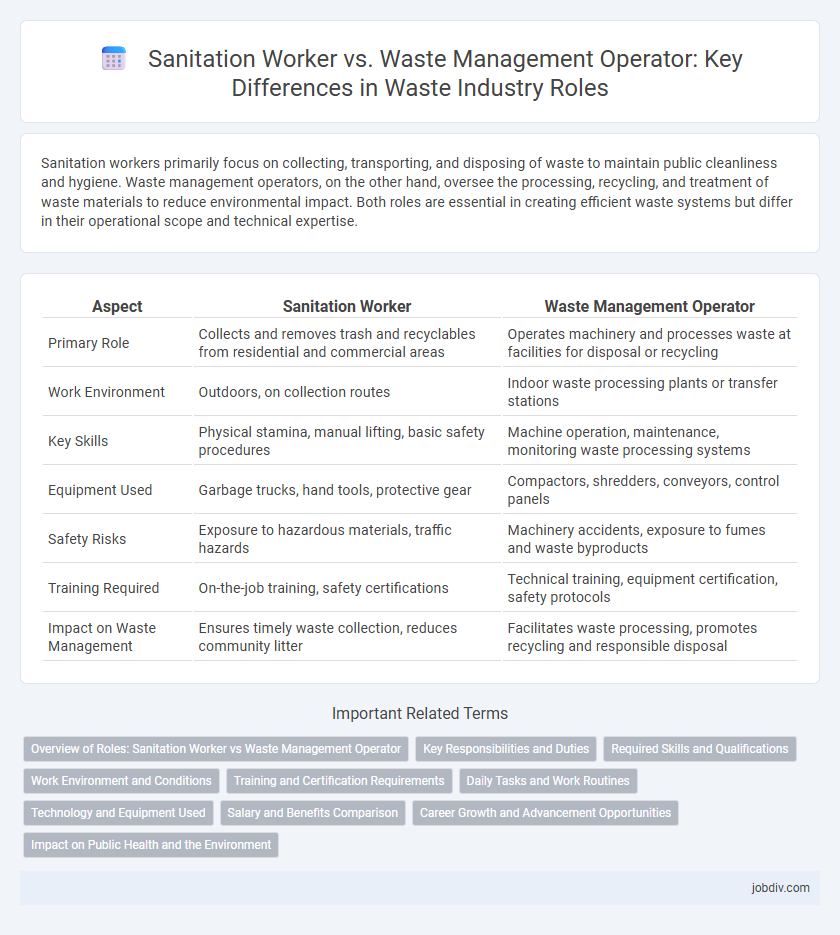Sanitation workers primarily focus on collecting, transporting, and disposing of waste to maintain public cleanliness and hygiene. Waste management operators, on the other hand, oversee the processing, recycling, and treatment of waste materials to reduce environmental impact. Both roles are essential in creating efficient waste systems but differ in their operational scope and technical expertise.
Table of Comparison
| Aspect | Sanitation Worker | Waste Management Operator |
|---|---|---|
| Primary Role | Collects and removes trash and recyclables from residential and commercial areas | Operates machinery and processes waste at facilities for disposal or recycling |
| Work Environment | Outdoors, on collection routes | Indoor waste processing plants or transfer stations |
| Key Skills | Physical stamina, manual lifting, basic safety procedures | Machine operation, maintenance, monitoring waste processing systems |
| Equipment Used | Garbage trucks, hand tools, protective gear | Compactors, shredders, conveyors, control panels |
| Safety Risks | Exposure to hazardous materials, traffic hazards | Machinery accidents, exposure to fumes and waste byproducts |
| Training Required | On-the-job training, safety certifications | Technical training, equipment certification, safety protocols |
| Impact on Waste Management | Ensures timely waste collection, reduces community litter | Facilitates waste processing, promotes recycling and responsible disposal |
Overview of Roles: Sanitation Worker vs Waste Management Operator
Sanitation workers are primarily responsible for the collection, removal, and disposal of household and commercial waste, ensuring public cleanliness and health. Waste management operators oversee the processing, treatment, and recycling of waste materials at facilities, focusing on environmental protection and resource recovery. Both roles are integral to effective waste management systems but differ in operational scope and technical responsibilities.
Key Responsibilities and Duties
Sanitation workers primarily focus on the collection and removal of residential and commercial waste, ensuring streets and public areas remain clean and free of debris. Waste management operators handle more complex tasks such as sorting, processing, recycling, and managing waste disposal systems within treatment facilities or landfills. Both roles require adherence to safety protocols but differ in scope, with sanitation workers emphasizing manual collection and operators focusing on waste processing and environmental compliance.
Required Skills and Qualifications
Sanitation workers must possess physical stamina, attention to safety protocols, and basic knowledge of waste handling procedures to effectively collect and dispose of refuse. Waste management operators require specialized training in operating heavy machinery, understanding waste sorting systems, and familiarity with environmental regulations to manage processing plants. Both roles demand strong problem-solving skills and adherence to health and safety standards to minimize environmental impact.
Work Environment and Conditions
Sanitation workers typically operate outdoors in various weather conditions, handling manual waste collection and often facing exposure to hazardous materials and physical strain. Waste management operators work in more controlled environments, such as recycling centers or treatment facilities, where machinery operation and monitoring tasks require specialized training and adherence to safety protocols. Both roles demand attention to hygiene, safety standards, and the ability to manage waste efficiently to maintain public health and environmental quality.
Training and Certification Requirements
Sanitation workers typically require basic training focused on safe waste collection and disposal techniques, often accompanied by certifications such as OSHA safety standards or local municipal permits. Waste management operators undergo more specialized training, including hazardous waste handling, equipment operation, and regulatory compliance, usually requiring certifications like HAZWOPER, CDL licenses, or environmental technician credentials. The distinction in training and certification reflects the complexity and regulatory demands of managing diverse waste streams and advanced processing technologies.
Daily Tasks and Work Routines
Sanitation workers primarily handle the collection and disposal of household waste, ensuring streets and public areas remain clean by emptying bins and operating garbage trucks. Waste management operators focus on sorting, processing, and recycling materials at waste treatment facilities, using specialized equipment to separate recyclables and hazardous waste. Their daily routines differ, with sanitation workers performing fieldwork and waste management operators working mostly in controlled environments managing waste processing systems.
Technology and Equipment Used
Sanitation workers primarily utilize manual tools such as brooms, gloves, and collection carts to clean streets and public areas, often relying on basic mechanized compactors for waste collection. Waste management operators employ advanced technologies including automated garbage trucks with hydraulic lifts, GPS tracking systems, and sorting machines that enhance efficiency in waste segregation and recycling processes. Integration of IoT sensors in waste bins assists operators by monitoring fill levels to optimize collection routes and reduce operational costs.
Salary and Benefits Comparison
Sanitation workers typically earn an average salary ranging from $30,000 to $40,000 per year, while waste management operators can expect higher wages, often between $40,000 and $55,000 annually, reflecting their specialized skills and responsibilities. Benefits for both roles usually include health insurance, retirement plans, and paid leave, but waste management operators often receive enhanced packages such as hazard pay and professional development opportunities. Salary disparities are influenced by factors like geographic location, certification levels, and union representation within waste management sectors.
Career Growth and Advancement Opportunities
Sanitation workers typically start with entry-level roles focused on waste collection and basic sanitation tasks, offering limited career advancement without additional training or certifications. Waste management operators often have broader responsibilities including waste processing, recycling coordination, and facility operations, providing more opportunities for career growth through specialized skills and leadership roles. Pursuing advanced certifications, technical training, or environmental management degrees can significantly enhance career progression in both fields, with waste management operators generally having greater potential for advancement.
Impact on Public Health and the Environment
Sanitation workers directly reduce public health risks by collecting and disposing of waste, preventing the spread of infectious diseases and contamination. Waste management operators optimize waste treatment processes, including recycling and hazardous waste handling, minimizing environmental pollution and promoting sustainable resource use. Effective collaboration between these roles enhances overall community health and preserves ecosystems by controlling waste at multiple stages.
Sanitation Worker vs Waste Management Operator Infographic

 jobdiv.com
jobdiv.com